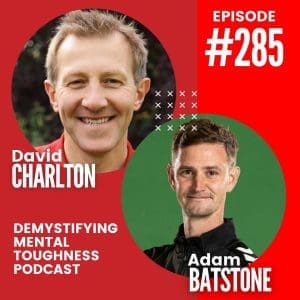28 Apr 2023

Helping You Gain A Mental Edge
3 Tips to Help You Manage Your Emotions Better so That You Perform with Trust
Is your mind often in overdrive thinking about your sport performance?
If this is true for you, I’d like you to consider 2 statements today which I’ve adapted from the short book. Letting Everything Become Your Teacher, 100 Lessons in Mindfulness by Jon Kabat-Zinn. I hopeful they’ll give you some food for thought on traps you may fall into.
Non-Doing
“Meditation is really non-doing. It is the only human endeavour I know that does not involve trying to get somewhere else but, rather, emphasizes being where you already are.”
Now when you consider sport, the likelihood is people who read this will have motivated and driven personalities. They may be all action and enjoy keeping busy. They will set goals regularly and enjoy striving to achieve them too. All good qualities but…
Tip 1: Be aware of this, that on occasions you may get carried away by doing, doing and doing more. Messages from sport are often about giving maximum effort, trying your hardest, outworking your competitors.
However there is a place for non-doing too, to let go of the striving, the planning, the reacting to performances, the paralysis by analysis. Sometimes by simply stopping to feel where you are can be a helpful act. The doing part can be often be born from a lack of trust and become habitual.
Question 1: When was the last time you stopped and did nothing?
Just Observe
“In practising meditations, we don’t try to answer questions. Rather we just observe the impulse to get up from the sitting, or to get caught in the thoughts that come into the mind.”
This type of practice can be very difficult for the athlete or coach who is all action and who is always thinking about how they can improve or the next match or event. Something I note a lot from my work is that when we’re competing regularly there is a tendency to become “reactive” always trying to get ready for the next performance. Often this can cause a degree of anxiety and is born out of poor planning. Focusing on the process which is something us Sport Psychologists talk about a lot becomes foreign to this person.
Tip 2: By focusing so heavily especially on outcomes, also often results in a lack of trust and you end up in your own head a lot, thinking, thinking and thinking even more. Try shifting your focus, consider the key ingredients of your performance and observe how closely you align to these behaviours.
Question: On a scale of 1-10, how much have you been thinking about results and outcomes related to your sport in the last week? (1 =Not at all, 10 = All of the time)
BONUS TIP
Be curious and tune into my most recent Demystifying Mental Toughness podcast episode with leading performance coach, Karl Morris who has worked with many elite professional golfers and athletes where he shares one great strategy on managing your emotions so that you can get out of your head and perform better more consistently. It’s an episode created for golfers however it relates to any sport.
The advice in this episode is particularly helpful for those who can battle with their mind which if we’re open and honest we all do to varying degrees. Every individual experiences “inner chatter” according to their situation and personality.
Here are some examples of people where I feel the resources in this mental edge can really help people.
“I’m so frightened that I’ve got to the point that I pull out of races on the day and I’m considering quitting triathlon for good.”
“Unfortunately Jimmy has been unable to get much game time this season due to suffering from pre-match nerves. He appears fine at training etc, however when it comes to match day he is unable to go through with it and can’t bring himself to even get out of the car. He’s been attending recent matches purely as a spectator.”
“She freezes on the pitch and goes into her shell, this results in frustration and tears.”
“Jack spends a lot of time thinking about his mistakes and then worries about what will happen in the rest of the match”
“On the golf course, I’m in my own head so much I struggle to enjoy the round.”
QUOTE OF THE WEEK

You’ll find 5 podcast episodes which link to mindfulness and meditation here and give you useful ideas to help you manage your emotions better in different situations:
Ep013: Karl Morris – How to stay present like a major champion
Ep092: Dr James Hegarty – ACT in Sport, Improving Performance through Mindfulness
Ep099: Trevor Jones – How to Deal with Overthinking on the Golf Course
Ep124: Dr Keagan Hadley – Long Term Injuries: How to Confront Difficult Thoughts and Emotions
4 Useful resources to help you master your mind include:
Guided Mindfulness Meditation Practices with Jon Kabat-Zinn
Using ACT and Mindfulness to Improve Your Sporting Performances
Why You Should Meditate To Improve Your Sport Performance?
3 Great conversations to have with your kids that relate to helping them manage their emotions:
Conversations with Kids – Trust Mindset
3 WAYS TO LEARN MORE ABOUT OUR WORK:

Best Wishes
David Charlton
Online Sports Psychologist | Mental Performance Coach who supports many highly motivated athletes, young and old, developing their skills or who are already highly skilled so that they gain a mental edge and get the most from their talent across the globe from USA/Canada to Great Britain and Ireland to UAE, South Africa, Australia and New Zealand, using ONLINE Video Conferencing.
Managing Director – Inspiring Sporting Excellence
Host of Demystifying Mental Toughness Podcast
Founder of The Sports Psychology Hub
Author of The Mental Edge
With over a decades’ experience supporting athletes, coaches, parents and teams to transfer their skills from training to competitive situations, under pressure.
T: +44 7734 697769







